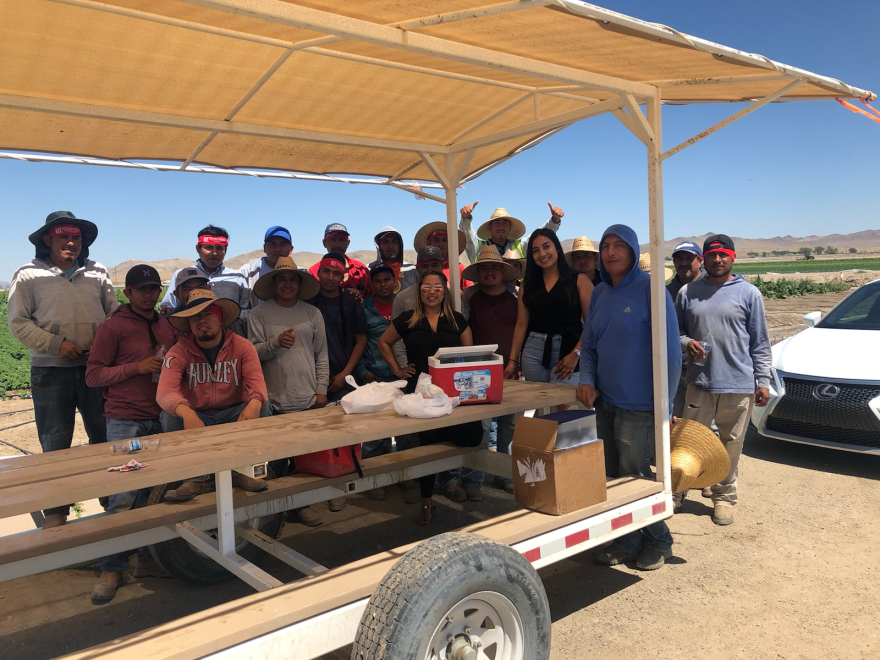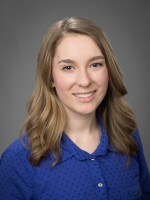Nevada farmworkers often have seasonal jobs with no health insurance or sick leave, which has created an additional strain for this community during the pandemic.
KUNR reporter Natalie Van Hoozer spoke with Cecilia Alonso of the Nevada Human Development Corporation in Fallon to learn more.
Natalie Van Hoozer: Cecilia, could you explain what kind of work you do with the Nevada Human Development Corporation?
Cecilia Alonso: Farm work, it's seasonal work. Our goal is to help those people find other careers. We provide ESL (English as a second language) classes, financial literacy courses. We can help them become a nursing assistant, and we cover all those expenses. We don't only service farmworkers. We also support the spouses and children of farmworkers. [We support them with] tuition assistance. We help pay for books or vocational training while they transition out of high school. The goal is to break the cycle of poverty.

Van Hoozer: Could you talk a little bit about what the landscape is for who qualifies for the services you provide and who doesn’t, and why that is?
Alonso: We're a nonprofit. We work with federal funding. In order for somebody to qualify into our program, they have to have legal status. If they are unable to work legally in the United States, they cannot qualify for our program. If the father is an undocumented farmworker, we can enroll his spouse if she has legal status. [We can help them] with the job search, career exploration, or job training. We do work with DACA recipients. They also have to have worked in farm work within the past two years. We also go by poverty guidelines, so they also have to fit that low-income bracket.
Van Hoozer: If you can’t help the undocumented population directly, who can?
Alonso: There's not a lot of support for undocumented individuals, period. Some Catholic churches help with some support sometimes, or other religious organizations might be able to [provide] support. I wish I had a list of people that can [help], but there's not a lot.
Van Hoozer: What are some of the most common challenges you’re seeing for Nevada farmworkers during the pandemic?
Alonso: The most common struggle I see is lack of food, especially in the rural areas. We're talking about Lovelock, or Yerington, or other rural counties. Some farmworkers, I would say most of them, don't qualify for state assistance. What I also see is [a need for] rental assistance. If they can't go to work for three weeks because they tested positive for COVID, or somebody in their family [did], they lose income. A lot of times, being a farmworker, you don't get paid for that time off. I had a family recently where the father died of COVID. He was a single parent. The adult daughter, who acts as the mother of the family, reached out to me when their dad died and said they were struggling with rent because he was the provider.
Van Hoozer: Are there any other things that have come up that you’ve noticed with this community that someone might not think about being a side effect of COVID for the community?
Alonso: Farmworkers are very underserved in general, with a pandemic or no pandemic. With COVID, we're trying to avoid having kids go to work to help their struggling farmworker families. I feel like the children are the ones who suffer the most. They're not only losing the opportunity to complete a year of high school or their senior year but also forced into the workforce early to help support their families. I see these struggles, and it breaks my heart that sometimes you can't help everyone and you can't do more.
Van Hoozer: What’s your connection with some of these farmworkers who you work with?
Alonso: My parents are from Mexico. They were actually farmworkers out in San Ysidro by the U.S. San Diego border. My father worked at the orange orchards over there and did other types of farm work when he originally migrated to the United States. When I see an older man working in the fields, or a woman picking melons, it reminds me of my parents. When I'm helping somebody, I can picture helping my dad. Helping people translate documents or helping them with something [else], I always think about my father. Some of the best parts of my work are getting to know these families and helping them, and that's why I've probably been doing my work so long.

This story was produced in partnership with Noticiero Móvil.

Our spring fund drive is happening now, and your continued support is what makes this vital reporting possible. Make a gift today.








